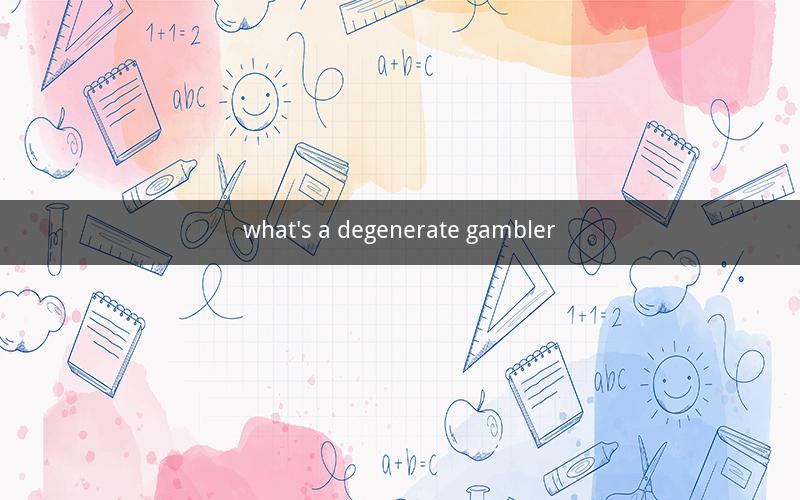
What's a Degenerate Gambler?
Table of Contents
1. Understanding the Concept of a Degenerate Gambler
2. The Psychology Behind Degenerate Gambling
3. Common Characteristics of a Degenerate Gambler
4. The Impact of Degenerate Gambling on Individuals and Society
5. Prevention and Treatment for Degenerate Gamblers
6. Legal and Ethical Considerations in Addressing Degenerate Gambling
Understanding the Concept of a Degenerate Gambler
A degenerate gambler is an individual who engages in excessive gambling behavior, often leading to significant financial, emotional, and social consequences. Unlike recreational gamblers who participate for entertainment and the thrill of the game, degenerate gamblers are driven by a compulsion to win back losses or to sustain a lifestyle that is funded by gambling.
The Psychology Behind Degenerate Gambling
The psychology of a degenerate gambler is complex, often involving a combination of factors. These may include a desire for control, the thrill of taking risks, or a belief that they can outsmart the odds. Many degenerate gamblers also struggle with underlying mental health issues, such as anxiety, depression, or substance abuse disorders, which can exacerbate their gambling problems.
Common Characteristics of a Degenerate Gambler
Several common characteristics often accompany the behavior of a degenerate gambler:
- Increased Risk-Taking: They are willing to take on greater risks with their money and time.
- Preoccupation with Gambling: Their thoughts are frequently consumed by gambling, even during non-gambling activities.
- Secretive Behavior: They may hide their gambling habits from friends and family.
- Increased Debt: They accumulate substantial debts as they continue to chase losses.
- Neglect of Responsibilities: Personal, professional, and family responsibilities are often neglected.
The Impact of Degenerate Gambling on Individuals and Society
The impact of degenerate gambling can be devastating, affecting not only the individual but also their loved ones and the community at large:
- Financial Ruin: Gamblers may lose their homes, savings, and retirement funds.
- Emotional Distress: Relationships can suffer due to the stress and secrecy surrounding gambling.
- Legal Issues: There may be legal repercussions, including arrest and imprisonment.
- Social Consequences: Communities can experience increased crime rates and strained resources due to gambling-related problems.
Prevention and Treatment for Degenerate Gamblers
Preventing and treating degenerate gambling requires a multifaceted approach:
- Education: Raising awareness about the risks of gambling can help prevent individuals from developing gambling problems.
- Self-Exclusion Programs: Many casinos and online gambling sites offer self-exclusion programs to help individuals control their gambling behavior.
- Professional Help: Therapies, such as cognitive-behavioral therapy, can help gamblers address the underlying issues driving their behavior.
- Support Groups: Organizations like Gamblers Anonymous provide support and resources for those struggling with gambling addiction.
Legal and Ethical Considerations in Addressing Degenerate Gambling
Addressing degenerate gambling also involves legal and ethical considerations:
- Regulation: Governments must implement and enforce gambling regulations to protect vulnerable individuals.
- Privacy: There is a balance between protecting individuals from harm and respecting their privacy.
- Responsible Gambling: Operators must promote responsible gambling practices and provide resources for those in need.
Conclusion
The term "degenerate gambler" refers to an individual who has lost control over their gambling behavior, leading to significant negative consequences. Understanding the psychology behind degenerate gambling, recognizing common characteristics, and addressing the issue through prevention, treatment, and legal measures are crucial steps in mitigating the harm caused by this behavior.
Questions and Answers
1. What is the primary difference between a degenerate gambler and a recreational gambler?
- A degenerate gambler is driven by a compulsion to win back losses or maintain a lifestyle funded by gambling, while a recreational gambler participates for entertainment and the thrill of the game.
2. Can a degenerate gambler overcome their addiction on their own?
- While some individuals may attempt to overcome their addiction independently, the majority benefit from professional help and support groups.
3. What are some signs that someone may be a degenerate gambler?
- Secretive behavior, neglect of responsibilities, increased debt, and preoccupation with gambling are common signs.
4. How does degenerate gambling affect family members?
- Family members may experience emotional distress, financial strain, and relationship problems as a result of a loved one's gambling addiction.
5. What role does society play in preventing degenerate gambling?
- Society can play a role by promoting education about gambling risks, implementing regulations, and supporting treatment programs.
6. Are there any legal consequences for a degenerate gambler?
- Yes, legal consequences can include arrest, imprisonment, and financial penalties for illegal gambling activities.
7. How can someone seek help for a degenerate gambling problem?
- They can seek help from mental health professionals, support groups like Gamblers Anonymous, or through self-exclusion programs offered by gambling establishments.
8. What are the most effective treatment methods for degenerate gambling?
- Cognitive-behavioral therapy, support groups, and self-help strategies have been shown to be effective in treating gambling addiction.
9. Can a degenerate gambler's addiction be cured?
- While there is no cure for gambling addiction, it can be managed and controlled through treatment and support.
10. How can gambling operators be more responsible in their business practices?
- Operators can promote responsible gambling practices, provide resources for those in need, and enforce strict regulations to protect vulnerable individuals.